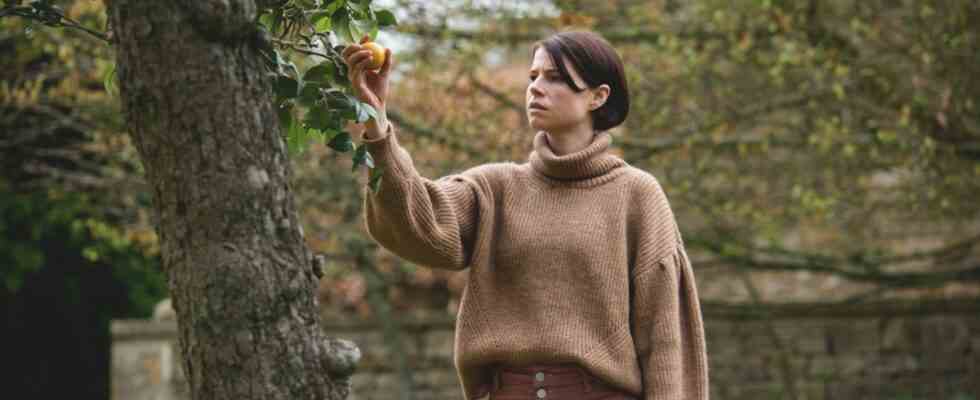That crippling sense of vulnerability. Where does that come from all of a sudden? It seems to seep into Harper’s head and body like a creeping poison. This age-old cottage in a backwater town in England, as if from the times, that she rented for a week. Isn’t it much too big for them, unprotected and accessible from all sides? Or that landlord who shows her around – isn’t he way too nosy, way too uptight in his jokes, way too glued to the fact that she’s traveling alone? Even this lonely, incomprehensibly lush green forest path directly behind the house – doesn’t it lead straight into the realm of the uncanny?
Because the film “Men” is told primarily through the face of its protagonist Harper Marlowe – the open, clear-cut, sane and also permanently somewhat defiant face of the wonderful actress Jessie Buckley – this is fundamentally about a female vulnerability. However, the narrator Alex Garland – writer, screenwriter and since the brilliant “Ex Machina” also auteur filmmaker and generally one of the most ambitious Mainstream culture thinkers – is of course a man. Which immediately creates an interesting reverberation: are women supposed to feel fundamentally recognized here, in an all too familiar need? And should men feel here, deep in their own bowels, what it’s like – this sticky odium of distress?
All men are played in different masks by one actor – very scary
In any case, as far as the men and the guts are concerned, this critic can attest to the plan’s success. “Men” manages to become a deeply disturbing film, even with the simplest means at first. When Harper, on her first walk in the woods, suddenly stands in front of a mountain with a semi-circular abandoned tunnel, tall and wide and eerily black. The light at the other end appears to be about half a kilometer away. Full of fear, she calls in and marvels at the multiple reverberations – until a mute silhouette rises on the far side and comes towards her, even starts to run. A moment of hesitation – then she turns and runs too. And leave the danger behind.
But such occurrences will become more frequent, with increasing scariness, the threats are advancing from the forest into your garden, even the local church and cemetery does not seem to be a safe place, nor does the pub. The few people Harper meets there are almost exclusively men, and they all seem to share the same slightly doughy, underwhelming traits. No wonder they are all played in different masks by actor Rory Kinnear, who in this film takes it upon himself to be almost the sole face of a thoroughly unhealthy masculinity.
It’s all incredibly uncomfortable, but in a masterly way. How far can you warp the everyday world in the direction of recognisability, until things become painfully clear, while still remaining within the framework of the idea that such happenings could happen to women anywhere, anytime? Very far, as it turns out. And yet one wishes that Alex Garland had actually seen this fascinating game through to the end, regardless of the drasticity that contemporary horror audiences might demand, even without the need to give his protagonist a pre-existing condition, a trauma that is hers distorted view.
The film works best when you forget the very first sequence very quickly and all the flashbacks to Harper’s past: there is a husband, weak and almost unbearably weepy, from whom she wants to divorce and then ends before her eyes jumps out of the window and falls into a lattice fence, with terrible consequences for her psyche. Why is that a pity? Because it paves the way for one of those well-known female characters who at some point can no longer distinguish between reality and imagination. As if the cinema didn’t have enough of that.
What does Alex Garland gain by doing this? A drastic second part, which can indulge uninhibitedly in the supernatural and in a dark symbolism, with bloody echoes of the slasher and zombie films. And also the opportunity to activate his latex special effects troops from the Body Horror department, which can then use maximum slime to illustrate the thesis that fatal masculinity always gives birth to itself. If you like it and can’t do without it, please do.
But the losses associated with this decision are more serious. As soon as you transfer the majority of the horror back to the inside of a female psyche, you release the outside world and in this case the male world from liability. And so, after a night in which a woman once again died almost a thousand deaths, you can simply say what men have always preferred to say when they feel threatened by women: It’s all imaginary, ma’am.
men, UK/USA 2022 – Director and Script: Alex Garland. Camera: Rob Hardy. Editor: Jake Roberts. Music: Ben Salisbury, Geoff Barrow. Starring Jessie Buckley, Rory Kinnear. Koch Films, 100 minutes. Theatrical release: July 21, 2022.

